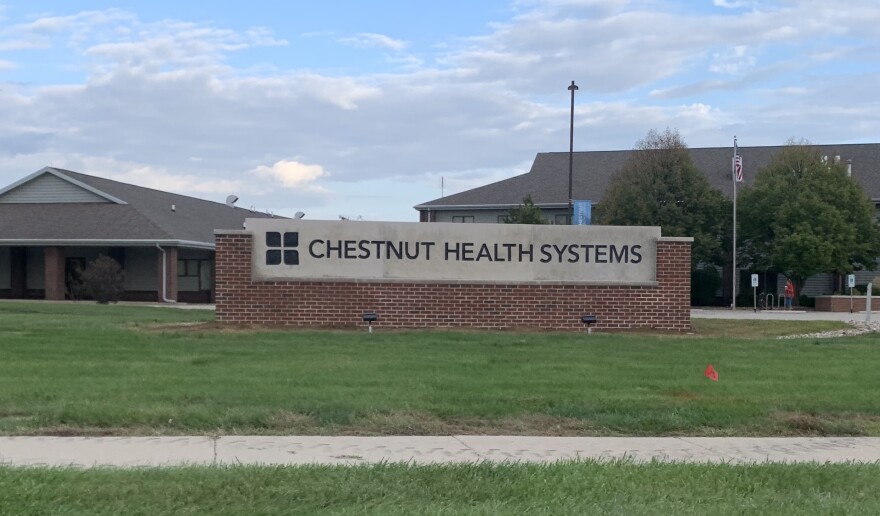The head of Bloomington-based Chestnut Health Systems said Gov. JB Pritzker's proposed boost in mental health funding comes at a critical time. The $140 million in additional money was part of Pritzker's budget speech last week.
Chestnut CEO Dave Sharar noted need has never been higher for such things as substance abuse and mental health treatment programs.
"Here in Bloomington-Normal, for example, with our crisis residential program for mental health crises, and for detox as a combined unit, we've had to deny some admissions because we simply didn't have the nursing staff or the 24-hour staff to cover those admissions. You do wonder what happened to some of those people who were not able to get help," said Sharar.
He said the inability to treat some who are receptive to getting help has societal consequences as well.
"Some will not get treatment. Some get depressed and demoralized. Some may get arrested. Some may commit an act of domestic violence. Some may use more, and put a burden on our emergency rooms and a burden on our criminal justice system. So really, this is a small price to pay to create better access," said Sharar, noting some programs around the state have closed or reduced service.
Chestnut has not had to do that.
"We've got great staff, motivated staff, but we've had so many shortages that the access has to get better. If you wait 30 days, or even for some people, a few days, that's not great access," Sharar during WGLT's Sound Ideas.
The additional money Pritzker has proposed to bipartisan approval would increase reimbursement rates for community-based agencies, something Sharar said was long overdue and could stave off collapse of an overloaded mental health treatment system.
"This would be the most significant increase our field has seen in literally decades," said Sharar. "This would get us back to sustainability."
He said the proposal would increase reimbursement by more than 20%. And there's a companion bill, to increase outpatient substance use disorder treatment by $41 million.
Sharar said two trade associations both estimate the number of unfilled mental health and behavioral health treatment positions in Illinois is about 10,000.
"During this great resignation, there have been very talented people who have moved to for-profits, digital disrupters, private practice and so forth, because of the flexibility and the increase in pay and salary, less complicated clients, and less paperwork. We certainly have had to compete with the commercial private sector, around minimum wage and, and all the benefits some of the retail companies are offering so we've lost people," said Sharar.
Chestnut Health Systems has boosted pay for many workers, offered signing and retention bonuses, referral bonuses, and made work more flexible to reduce attrition. To do that, Sharar said Chestnut has had to use reserve funds because state reimbursement rates have been so low.
Out of 700 positions in the Chestnut organization, there are well over 100 vacancies in Chestnut's clinical program, Sharar said.
He said other programs in the state have staff turnover rates exceeding 50% and more vacancies proportionately than Chestnut, calling it an unprecedented situation.
"Some of them simply can't afford to stay in this build with the way salaries are going. So, I believe with the rate increase, we will have enough ammunition to do a better job of recruiting and retaining," said Sharar.
Of particular note is a shortage of people with master's degrees in clinical psychology or clinical social work. They command much higher salaries and have an easier track to private practice.
"But we want people who really want to fulfill a mission, why they went into this field. Sometimes, our clients are more complex than what you would see in a private practice environment. But the rewards of moving many of those clients to independent healthier life are great, and so we want mission-oriented warriors," said Sharar.
Another way to partly address the shortage of people in that segment of the field, Sharar said, is to reduce the qualification pre-requisite to a bachelor's degree in some situations.
"Bachelor's-prepared people can deliver excellent treatment if it's evidence-based and if there are protocols to follow for a treatment approach. And if they're properly trained and monitored, I think lesser credentialed staff can do a great job in many of these roles," said Sharar.
He said advocates are working toward having the state relax some of those limits on reimbursement for bachelor's-level people as they already have for tele-health.
Chestnut has about 18,000 clients in its two regions: central Illinois and the Metro East area around St. Louis.


